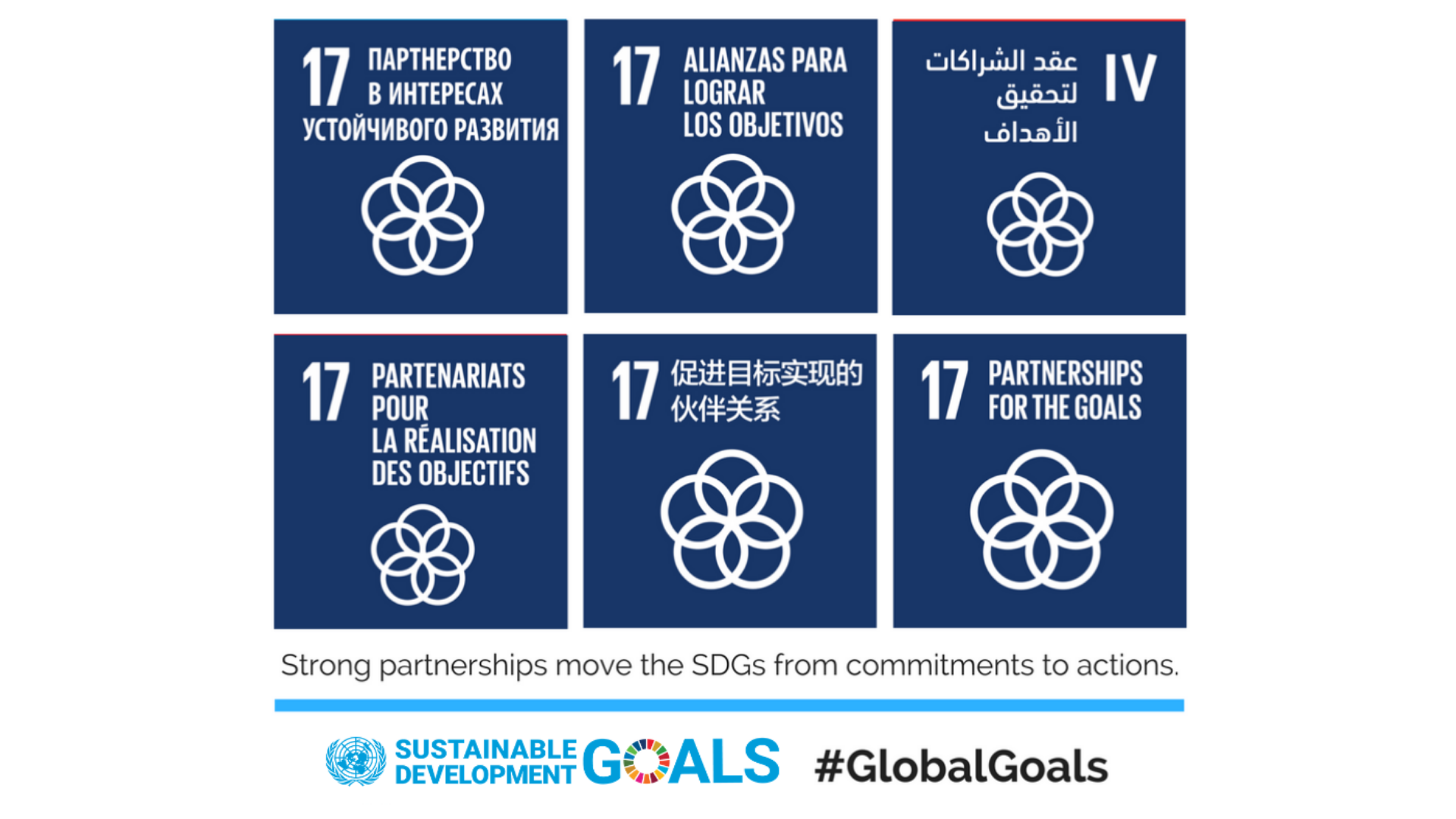Partnerships: A Game Changer for a Sustainable Recovery from COVID-19
Thursday Jun 17,2021 | Social Innovation
My key takeaways after moderating the 2021 ECOSOC Partnership Forum

By Christy Davis
Being concerned about other people is especially relevant in today's world. If we consider the complex inter-connectedness of our modern lives, how we depend on others and others depend on us, our outlook will change. We’ll begin to see 'others' not as somehow distant from us, but as people we are in touch with, people close to us; we will no longer feel indifferent to them.
Dalai Lama
From the global economy to activities in communities, the world is an interconnected place. Everything we do has the potential to generate a possible chain reaction of effect and impact. Relationships, circumstances, actions and ways of living our lives may be clear and straightforward to us as individuals, but may actually sit within a context lined with complexity and implications far beyond what we can see.
This is true as we continue to contend with a global pandemic. The COVID-19 impact beyond those who have been infected or died is staggering. 150 million people may be forced into extreme poverty. Falling revenues combined with costly pandemic relief measures have increased global debt by $20 trillion since the third quarter of 2019. By the end of the year, economists expect global debt to reach $277 trillion, or 365% of world GDP. 20 countries where famine is a real possibility or reality.
It is more important now than ever to practice “changemaking skills” and work together in partnership to bring positive change to the world. A changemaker is someone who “takes creative action to solve a social problem.”
Key changemaking skills include:
- Empathy: the ability to understand and identify with people who are different (and distant) from us, connecting people and aligning intentions for the good of all
- Collective teamwork: the ability to build collaborations and partnerships that directs collective resources, wisdom and skill sets towards a collective goal
- New leadership: the collective action and inclusive responsibility of all working towards a shared goal
- Creative changemaking: utilising the above three skills to identify potential solutions and commit to action for the good of all
When people from different sets of backgrounds and beliefs come together, they bring with them the power of knowledge and diversity of strengths and resources that, if met with a heart of humility and willingness, can help solve wicked global problems.
The recent United Nations Economic and Social Council (ECOSOC) Partnerships Forum provided an excellent illustration of changemakers from across government, private sector and civil society putting these skills into action. On a mission to achieve the UN Sustainable Development Goals (SDGs), the ECOSOC Partnership Forum is convened every year to connect diverse leaders who come together with one goal in mind: to share how they are creating impact through the power of partnership, articulating practical actions, what worked and what challenges they face, and to identify new ways to collaborate.
This year, the Forum focused on how the power of partnership is vigorously helping societies respond to and rebuild from the COVID-19 pandemic. The tasks ahead are daunting as the pandemic has exacerbated levels of poverty and other vulnerabilities for many countries and communities. Discussions revolved around transforming economies and levelling up societies to realise the 2030 Agenda and SDGs. As Munir Akram, ECOSOC President said, "Partnerships are invaluable instruments to promote prosperity and development. We must build and fully utilise these partnerships to respond to and recover from the COVID-19 crisis."
Having had the privilege to moderate this insightful panel discussion, I'd like to share three reflections I’ve taken away, and how they underscore the need for us to intentionally cultivate changemaking skills.

UN Web TV screengrab of this year’s ECOSOC Partnership Forum, held on 3 May 2021. Christy Davis (centre) with ECOSOC President Munir Akram (top left).
Stay flexible: Adaptability is a must
In our lifetime, we have not experienced a world where the ground has shaken under the feet of virtually everyone. Our lives as we knew them are changed: we endure these months and plan for a post-COVID era.
A recurring sentiment from the forum was the need to be flexible and agile. Particularly when looking for partnerships, it is essential to seek out a broad view across both systems and ecosystems. The Forum showed how beneficial it was to have panellists from very different backgrounds (business, government, non-profit and a global multi-sector partnership), resulting in a wide range of opinions and expertise. On a wider scale, the idea of staying flexible and adaptable will not only broaden our reach but allow our discovery of other problems we may not have known about. It also helps us look at issues from a different perspective.
Providing a business perspective was Markus Hottenrott, Managing Director and Chief Investment Officer of Morgan Stanley Infrastructure Partners. He shared how he aligns corporate and partnership strategies, balancing a profit-oriented business with environmental, societal and corporate governance (ESG) priorities. “We are ultimately profit-oriented, we seek returns for our investors; nevertheless, this topic of ESG…has accelerated massively through the COVID-19 crisis.”
Looking at energy storage and the need to reduce carbon footprint, he explains, "If you buy a fossil fuel-related asset and you optimise it to reduce CO2 emissions, you are actually making a positive impact on the environment." We are seeing strong, sustainable, successful businesses operate with stewardship of the planet and its people.

Think transformative, not transactional
Partnerships need to have an impact by being responsive to local demands and needs. Talking about an issue builds awareness, but without taking action the needle doesn’t move. Meaningful partnerships benefit societies that need them, and the impact can set in motion a domino effect of more ecosystem collaboration.
Digital technology is a game-changing vehicle that facilitates this. Assistant Secretary-General for Strategic Coordination in the Executive Office of the Secretary-General at the United Nations Headquarters in New York, Volker Turk, shared that open-source generative sharing is vital to create "deep collective action." With technology, we now have the benefit of leveraging expertise from the best minds around the world. Take the accelerated development of the COVID-19 vaccine as an example. Researchers have successfully developed a vaccine that would typically take eight to fifteen years to develop, thanks to the collaboration between the scientific community between the public and private sector, enabled by technology and the internet.
The story of how this happened was shared by the Coalition for Epidemic Preparedness Innovations’ (CEPI) Dr Richard Hatchette. CEPI co-leads COVAX, which works for equitable vaccine access globally. He noted that “inclusive multilateralism…to counter vaccine nationalism” is key, but we “can’t pretend we have overcome the forces of self-interest and continue to work hard to narrow the equity gaps that have emerged…”
From medical help to creative financing to aid pandemic recovery and infrastructure, keeping a "leave no one behind" (LNOB) mindset also helps key decision-makers stay on track. Human nature lets our environment influence us, but the LNOB principle can remind leaders of the barriers to entry faced by largely marginalised populations.
As Turk said, "There is no doubt, as we move ahead, there is a need for a massive mobilisation by countries, and a wide range of stakeholders to engage in transformative actions to reach the sustainable development goals and to recover from the pandemic."
The question is: How can we cultivate a greater spirit of generative sharing?

Nurture an ecosystem to leverage the power of partnerships
The benefits of partnerships cannot be underplayed. Partnerships bridge space, distance, and differences to tackle a host of significant sustainability challenges across all spectrums, whether it's social, environmental or economic.
Jens Wandel, Under-Secretary-General of the UN and Special Adviser to the UN Secretary-General on Reforms shared how the UN created a “solutions catalogue” – a pipeline of well-defined projects for urgent needs. "Innovation sits in this type of solution catalogue, where it can become a vehicle to communicate leads for partnerships … because partnerships are not only about the funding, but also about creating opportunities and removing barriers." Such solutions demonstrate the power of having an ecosystem or network consistently growing and innovating to reach out to different marginalised communities.
Anousheh Karvar, Delegate of the French Government to the Governing Body of the International Labour Organization and Chair of SDG Alliance 8.7 further explains how stakeholders like NGOs, trade union organisations, industry networks, and employer associations can all benefit from partnerships as a collective endeavour for a specific outcome. She shared from a very different vantage point: Alliance 8.7 is a global partnership against child labour, forced labour, trafficking and modern slavery. "Former victims of labour are encouraged to share their stories, all of which fuels the alliance to go beyond advocacy, toward action." How does COVID exacerbate forced labour and trafficking? She sees how interdependent our economies are…forced labour is a result of many factors, and international supply chains can be conduits for exploitation – but also provide a highway for collective response based on solidarity and co-responsibility.
Solidarity and co-responsibility for the way people work across a supply chain can trigger an opportunity for positive systemic change that illuminates ways we can flourish together, both economically and socially. We can identify the missing gaps through global discussions like this to foster better communication and strengthen our networks.
The value partnership and collaboration brings to strengthen an ecosystem is profound. Partnering across national borders plays a vital role to bridge cultures, explore diverse perspectives, develop a common language for collaboration, and co-create new and shared value producing a multiplier effect of sustained social impact. Charlotte Arribe, Associate for Entrepreneurship Programme at the World Federation of UN Associations who spoke on behalf of the Citypreneurship Initiatives shared that through ecosystem activities, they worked with different city governments and tapped into the potential of entrepreneurs to source hundreds of sustainable and profitable solutions to solve one city problem at a time.

Taken from un.org
Just as UN Global Compact Executive Director Sanda Ojiambo said in her closing remarks, "When it comes to partnerships, the rules have changed. Multi-sector partnerships and networked multilateralism are key themes. We need to seize the opportunities before us."
In summary, the concept of partnerships is recognised as a vehicle to pool strengths for transformational impact. While it originated from two people or groups working together for mutual benefit, the concept of partnership has evolved over the years. Anchored in changemaking capabilities such as empathy, collective teamwork and new leadership, the depth of impact, and the velocity of how partnerships can serve as a core driver are necessary as we move with anticipation toward a post-COVID era.
At the Lien Centre for Social Innovation we love exploring partnership-driven innovations, be it through applying evidence-based insights, capacity building or empowering changemakers that are tackling social needs. All research is freely available on our website. We’d love to hear from you!
Unless otherwise stated, all images via rawpixel.
Christy Davis is the Executive Director of the Lien Centre for Social Innovation at the Singapore Management University.